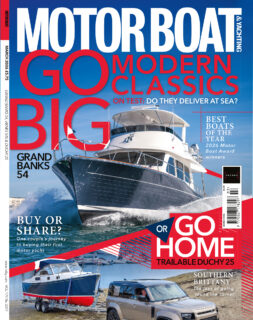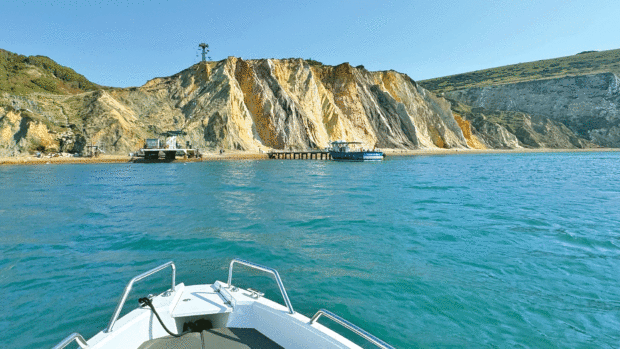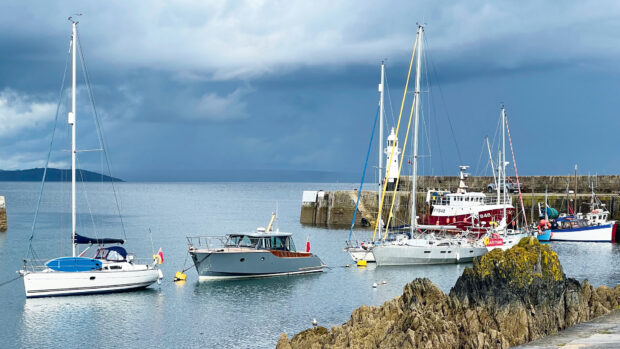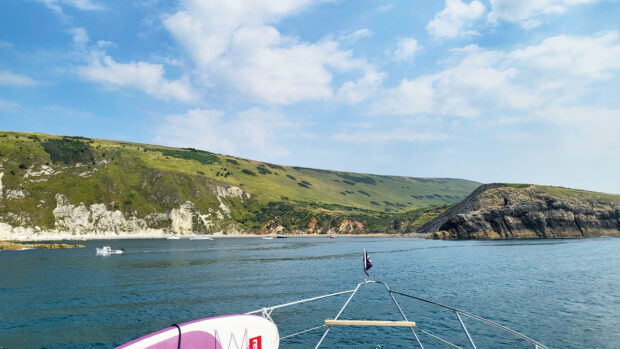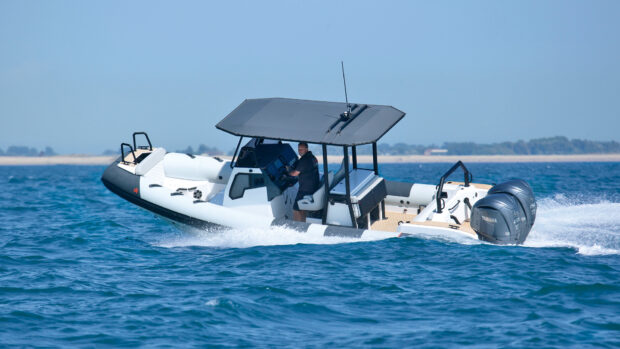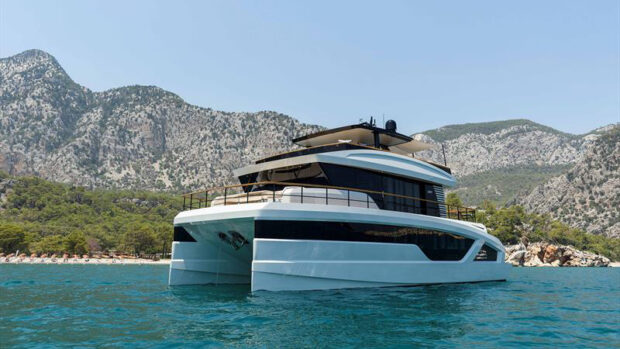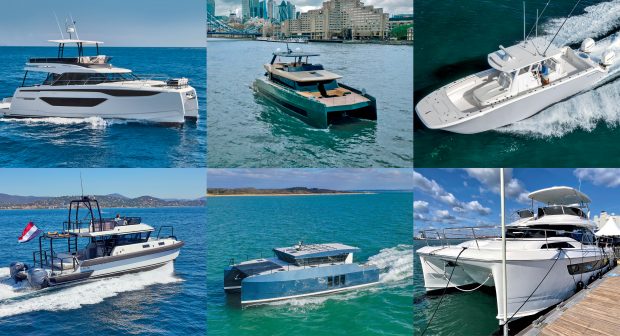The sheltered sounds of the Firth of Clyde offer spectacular scenery, some intriguing history and a grand feeling of space – particularly when aboard a comfortable 1930s motor yacht
Early last September, Jane and I accepted an invitation to cruise with friends aboard their 1930s motor yacht Chico. Designed by the legendary G L Watson & Co, Chico was built by James Miller in Fife. A Dunkirk Little Ship, she has enjoyed a full and active career, which continues under her present owners Gus Geddes and Sue Maclachlan. Starting from Oban on Scotland’s west coast, Gus and Sue run summer charter cruises around the Inner Hebrides in the civilised style to which their elegant ship is accustomed.
Our original plan was to work south round the Mull of Galloway and into the little-known waters of Solway, but strong westerlies made it prudent to stay in the relatively sheltered Firth of Clyde. This was certainly no hardship because the sounds and channels inside the Mull of Kintyre provide magnificent cruising amidst magical vistas of mountain peaks and glittering sea lochs.
Here you can find cosy anchorages in any weather. At 73ft and 75 tonnes, Chico is well suited to lying at anchor. With her extremely comfortable accommodation, deep freeze and huge water tanks, you can be totally independent of the shore for days on end. The scattered harbours are fascinating too, close-knit communities in a primeval landscape where self-reliance is a way of life.

A 73ft classic motor yacht, Chico can host up to six guests
We joined ship at the James Watt Dock Marina in Greenock, which is located on the south bank of the River Clyde. She lay next to a row of imposing brick warehouses, which we discovered were once owned by the Tate & Lyle sugar company. A keen wind sliced through the marina and we were soon in Chico’s saloon, tucking into tea and homemade chocolate cake.
Into Loch Long
Never one for lingering in harbours, Gus got us under way soon after tea. Joining the Clyde channel, we nosed out past the impressive Ocean Terminal and then Gourock Bay, with its yacht moorings and ferry terminal. West of Gourock, Chico swung north into Loch Long, a commanding fjord cutting far inland between wild majestic hills.
There are mysterious vibes in Loch Long, which is marked as a submarine exercise area. You must stay in the charted channel, which leads clear of a restricted military zone on the east shore. Part of the Trident defence system, this rather sinister base is guarded by patrol boats and is rich in local stories of underground chambers and passages. However, we couldn’t see much apart from stark towers and a massive jetty, although a police launch hovered offshore.
We travelled two miles further up Loch Long, then branched left into Loch Goil, a remote and quiet reach, which is fringed with rugged slopes and pine forests. Gus nudged the boat into a shallow bay on the south shore where we anchored to spend the night in total peace.

Swinging out the dinghy to explore the scenic shoreline
Out in the sticks
We woke to warm sunshine and glassy calm except where a few guillemots were swimming. Jane and I pulled ashore for a stroll before breakfast, landing on a grassy knoll near some grazing cows. An otter paddled away with a rippling wash.
Climbing a stile, we headed for Carrick Castle, a gaunt stone refuge on a rocky spur, built by clan Campbell in the 14th century and still gloomily defiant. This is castle country, and they pop up everywhere, harbouring the ghosts of Stewarts or MacDonalds brandishing broadswords and gnashing their teeth.

Five of the best British charter holidays
Peter Cumberlidge picks his top spots for a British charter, from Loch Ness to the Broads, and the ideal boats

Top ten alternative British boating bases
Look beyond the typical South coast boating bases and there are plenty of welcoming harbours that offer some delightful experiences
Well exercised, we returned on board for a Full Scottish, including Stornaway black pudding and traditionally cured Rothesay bacon. Coffee was brewed as we meandered back down the loch and then south towards Bute, a long fertile island separated from mainland Argyll by narrow inlets called ‘kyles’.
There’s always traffic to watch in the Firth of Clyde. Caledonian MacBrayne ferries shuttled across and Chico herself was a fine sight for the passengers. A submarine slid past to port, sleek and menacing with nobody in sight. Off Toward Point, a Rothesay ferry crossed our bow, carrying day trippers to this lively Victorian resort. Swinging west behind it, we passed a wide fish farm before cruising north into Loch Striven.

Many wartime forays were rehearsed here, giving these waters added spice
Loch Striven
Not many boats visit Striven, which is why we did. Mysteriously deep and with few access roads, the loch has an intriguing history. During World War 2 its upper reaches were requisitioned by the navy for midget submarine training. The daring attack in Norway on the German battleship Tirpitz was carried out by six boats from the 12th Submarine Flotilla.
Fish farming seemed tame after midget submarines, but it was interesting seeing a barge laden with thrashing salmon and sea trout. We saw no other vessels beyond the mouth and it was soothing to follow this beautiful waterway between colourful braes of bracken and heather. Fir trees flourished near sea level, protecting isolated cottages and oases of grass. A grey chapel stood at the mouth of a stream.
As the shores steepened and drew closer, the loch felt more like a Norwegian fjord, which is why the navy picked this lonely spot for exercises. We tried to imagine the 50ft four-man subs groping their way into a desolate inlet above the Arctic Circle, tasked with laying charges below Tirpitz. Two boats succeeded and the battleship was disabled for over six months, a significant tactical gain. Many wartime forays were planned and rehearsed in the lochs of the Firth of Clyde, giving these waters added spice.

The term ‘Kyles’ comes from the Gaelic word for narrows
Kyles of Bute
Having savoured Loch Striven’s cloak-and-dagger atmosphere, we slipped back towards Rothesay and turned into the East Kyle of Bute, one of my favourite corners of the west coast. Bute slots into the mainland like a jigsaw piece, leaving a U-shaped channel around its northern end. The Gaelic meaning of kyle is ‘narrows’, and the East Kyle shrinks to a biscuit’s toss between low skerries off the island’s tip. The navigable gaps are skimpy by Clyde standards and we watched a couple of seals sunning themselves on their private beach.
While there are several charted anchorages around the skerries, Gus prefers a nicely hooked bay half a mile north on the east shore. Here we anchored at a three-way crossroads between the Kyles and Loch Riddon, a dour looking cul-de-sac, which shoals after a mile. By contrast, our anchorage was anything but dour, bordered by grassy meadows and cattle at the water’s edge. We had views down the West Kyle and across to the peaks of Kintyre. The sense of space was uplifting as we lounged on deck with tumblers of peaty Arran malt, distilled barely a dozen miles away.

Reefs north of the island guarded by a stone beacon
Caladh Harbour
Opposite our bay, the sleepy cove at Caladh hides behind a wooded islet where rhododendrons thrive in the mild Gulf Stream climate. Close enough to real hills to feel properly Scottish, this delightful retreat is cocooned by soft green shores. Two houses occupy a clearing in the trees. You can enter Caladh either side of the island, and next morning Gus eased Chico in from the south, staying in the middle to avoid rocky patches off each bank.
With still weather we anchored well into the harbour, near a white stone beacon guarding reefs north of the island. A seagull perched on the topmark, unmoved by the rattling chain, and eider ducks drifted about. Through the north gap we saw the craggy scars of Creag Fhada, popular with walkers on summer days.
Jane and I had a jaunt in the dinghy, venturing up Loch Riddon as far as Ormidale Lodge, an austere Victorian retreat with its own pier. The house has a flamboyant round tower with a pointed, witch’s hat roof. It was rather a spooky place to explore and we were soon back on board, quaffing cool Sauvignon with a luxurious lobster lunch.
Into Loch Fyne
Heading down the West Kyle, we emerged into Inchmarnock Water, a romantic sounding name and a spectacular junction. A few miles to the south, the Isle of Arran steals the show, its highest peak 874 metres above the sea. East of Arran are the grand expanses of the lower Firth. For now, Chico turned north into Loch Fyne, Scotland’s longest sea loch at 36 nautical miles.

Sue relaxes on deck taking in the ever changing views
We passed Portavadie on the east shore, a slightly chic marina with a gift shop and spa, yet a safe all-weather haven with berths for larger boats. Facing Portavadie, East Loch Tarbert is alive with regattas in high season and renowned for its restaurants and seafood festival. Seven miles above Tarbert the loch divides, with a short west arm leading to Ardrishaig and the Crinan Canal. We stayed in the main loch, following a dog-leg channel past Otter Spit, which stretches three quarters of a mile off the east bank. Above the spit you can anchor near the Oystercatcher Inn, landing at a dinghy pontoon. Three miles further up, Loch Gair is an almost landlocked pool, secure in any weather.
We were bound well beyond Loch Gair to Inveraray, a pleasant 18th-century ‘new town’ built by the Duke of Argyll to concentrate local commerce safely away from his secluded manor further north. The Georgian waterfront is striking and Inveraray has a pretty pier harbour where a famous Clyde steam puffer – the Vital Spark – lay alongside. The anchorage had plenty of swinging room and a stunning outlook, with views up a creek towards an old arched bridge.
Inveraray is fun to explore and, surprisingly, its jail and courthouse museum is worth browsing. The Duke obviously kept a tight rein on his peasantry. The town’s collection of eateries would take a week to sample and we opted for the Samphire Seafood Restaurant, where the mussels and queen scallops were first-class. Less is more with fish cookery and I was happy with a bowl of local mussels steamed in white wine, followed by simple Arran ice-cream to finish.

Lochranza is now the only distillery on Arran
Towards Arran
On a quiet sunny morning Chico pushed back down to Inchmarnock, the engines virtually inaudible on deck. We reclined in steamer chairs, watching the hills slide by. Loch Fyne is mostly deep and easy, but a few rocky skerries squeeze the channel off Lachlan Bay and its ruined castle.
From the mouth of the loch, Arran looked gorgeous against glittering light, its mountains overlapping like some mythical Mediterranean landfall. On its east side we saw the hump of Holy Isle off Lamlash harbour. Our target was Lochranza at Arran’s north end, a sizeable gulf enclosed by heathery hills. There are visitor moorings here, though we anchored in usual Chico fashion. The reason for calling was a whisky distillery, half a mile inland up a fabulous green glen.
Founded in 1994, the Lochranza distillery is now Arran’s sole whisky producer. The island once had about 50 stills, mostly illegal, and the last registered distillery closed in 1837. From the dinghy pontoon, Sue set us a brisk pace up the glen to a cluster of stylish white buildings in a landscaped park. The ‘classic’ modern architecture and mountainous setting are rather special. Neighbouring Loch na Davie is said to have the purest water in Scotland, a good start for mellow single malts. The light and fruity Arran 14 year is a gem, finished in sherry and bourbon casks, and much to my taste.

Chico was a Dunkirk Little Ship and has enjoyed an active career
Kilbrannan Sound
Scottish names roll off the tongue like sea shanties. We were running down Kilbrannan Sound, the four-mile-wide strait between Arran and the long peninsula of Kintyre. A stiff west-south-westerly had changed the mood and we stayed half a mile from the weather shore. Over to port, overfalls were seething on Whitefarland Bank and the Arran coast was white where breakers were driving ashore. This side of the island is forbidding in a bit of weather and we huddled gratefully under the lee of Kintyre.
Off Crannaich we had our own little flurry of overfalls, but they were soon astern as we drew south of Carradale Point. Down near the end of Kintyre several yachts were converging on Campbeltown Loch. We’d be joining them, until a waving cold front passed by. Campbeltown has a well-marked entrance, with a lovely green island off its south headland and a wide sandy bank between them. Inside, the loch is safe in any conditions with plenty of room to anchor.

Campbeltown is a natural jumping off point for Northern Ireland or the Western Isles
Campbeltown harbour
A natural staging post in the Firth, Campbeltown is used by yachts, fishing boats, CalMac ferries and coasters. It is a strategic jumping off point for Northern Ireland or any boats making for the Western Isles outside Kintyre. There’s a small marina, but we anchored under the open north shore west of the prominent Craigard House Hotel. Campbeltown is known for its whisky distilleries, though Jane and I had done our shopping and fancied some exercise ashore.
Landing at the marina, we followed a leafy lane round to the tidal causeway leading to Island Davaar. Having timed our arrival for two hours before low water, we were soon walking out to the island and its neat white lighthouse. An old lookout building and lightkeeper’s house have been converted into holiday lets. Otherwise, Davaar is uninhabited except for caretakers, some sheep and a few nimble goats. The island has several caves, one containing a wall painting of the crucifixion from 1887. Absorbed by all this, we just managed to reach the mainland again before the tide swirled in.

The unmistakable outline of Ailsa Craig’s domed profile
Out to Ailsa Craig
Gus proposed cruising round Arran to Lamlash harbour and then up towards the inner Firth. The wind veered north-westerly overnight and was forecast to ease, so from Campbeltown we steered south-east for a while to keep the weather astern and pass a few miles north of Ailsa Craig. Another of those evocative names, this stark sheer island is unmistakable and almost a logo for the Clyde. Ailsa Craig is uninhabited these days, but countless gannets and puffins nest here. It’s exciting to pass this looming granite outpost, one of the great seamarks of the British Isles.
The sea was quieter as we curved north for Lamlash. This spacious natural harbour feels dramatic as you cut inside Holy Isle and cruise two miles to the anchorage. Lamlash village straggles round the head of the bay – a line of very Scottish cottages below gently sloping farmland. Fetching up outside the moorings, we landed at the pier. It was restful ambling along to the village hub, with its whitewashed buildings, tall church tower and friendly Drift Inn near the bowling green.

Surveying the scene from Chico’s elegant wheelhouse
Up to Great Cumbrae
From Lamlash, Chico rolled north towards the Cumbrae Islands. A scant mile wide, the southern gateway to the inner Firth leads between the tail of Bute and Little Cumbrae. It was an ideal day for this glorious approach, with sparkling light and a freshening south-westerly giving zest to the scene. Astern were the heights of Arran and more open water, which would soon be rough – to port the rural edge of Bute, to starboard the Elbow lighthouse on Little Cumbrae.
Hanging a right into Cumbrae Pass, we pressed on for the east side of Great Cumbrae, anchoring south of the ferry pier. This enchanting spot has excellent holding and panoramic views across to Largs. For our last night before returning to Greenock, we couldn’t have wished for a better billet. While the strengthening wind gusted hard off the island, Chico was perfectly snug under an attractive weather shore. There’s surely no finer sensation than hearing the elements howling outside as you pour the first glass of the evening.
